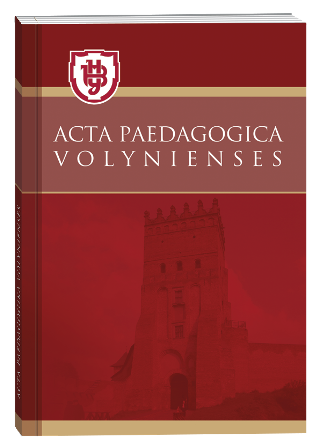FORMATION OF PRIMARY EDUCATION LEARNERS’ EMOTIONAL INTELLIGENCE IN THE LESSONS OF PHYSICAL EDUCATION BRANCH DURING GAME AND COMPETITIVE ACTIVITIES
DOI:
https://doi.org/10.32782/apv/2022.3.5Keywords:
emotional intelligence, emotional competence, emotions, physical education branch, game and competitive activity, primary education learners, New Ukrainian school.Abstract
The article reveals the relevance of the competitive nature of physical education and stressful conditions, which are undoubted catalysts of various emotions that can affect sports performance, and each sport has special physical and technical characteristics that require special skills. The sensitivity and receptivity of primary education learners to this kind of emotional stimuli contribute to the development of emotional intelligence. Since «its main structural elements begin to develop in primary school age and do not disappear, but are improved during schooling, therefore, by the time of graduation, a young person has the opportunity to achieve such a level of development, including the development of emotional intelligence, that in adult life he can successfully to continue learning, to organize positive communication with new people in new social conditions, to engage in social relations during practical activities» (Zarytska, 2011). A large amount of research has highlighted the importance of emotional intelligence for prediction in all areas of life. Therefore, it is not surprising that interest in emotional intelligence in physical education lessons has also grown significantly. The article analyzes the influence of physical education classes on the development of primary education learners’ emotional intelligence, its features for this age category. Theoretical methods were used to write this article: analysis, synthesis, induction, deduction. A significant relationship between primary education learners’ physical activity and various components of emotional intelligence was found. Age and gender are key moderators of this relationship: by gender, girls have higher emotional intelligence than boys. The analysis of indicators of their emotional intelligence showed certain differences in the level of children’s emotional intelligence during individual and team sports and sports games. A teacher who is able to regulate his own emotions perceives the motivations of his pupils, and this understanding affects their results. The analysis of scientific works generally proved the importance of emotional intelligence for achieving success and high results in physical education lessons during game and competitive activities by junior pupils and teachers, but taking into account the heterogeneity of research results, there is a need for further scientific research on this problem. At the same time, it is necessary to improve the methodology of these studies taking into account the specifics of various types of physical activity.
References
Виготський Л. С. Гра і її роль у психологічному розвитку дитини. Питання психології, 1996. № 6. С. 62–76.
Гоулман Д. Емоційний інтелект. Харків : Vivat, 1995 (2020). 512 с.
Державний стандарт початкової освіти. Учитель початкової школи. 2018. № 4 (вкладка). С. 1–16.
Зарицька В. В. Компетентнісно спрямована освіта: перший досвід, порівняльні підходи, перспективи: матер. Розвиток емоційного інтелекту в контексті компетентнісно спрямованої освіти; Всеукр. наук.-практ. конф. Київ, 2011. 92 с.
Кірєєва У. В. Теоретичні підходи до психологічного вивчення Я-концепції. Психологія і суспільство. 2010. № 4. С. 111–119.
Марченко А. О. Поняття емоційного інтелекту: теоретико-психологічні підходи, дефініції і структура. Вісник Національного університету оборони України, 2011. С. 172–174.
Мединська Ю. Теоретичні підходи та практичні аспекти діагностики компетентності особистості у сфері емоцій. Практична психологія та соціальна робота. № 10. 2013. С. 11–15.
Нова українська школа. Концептуальні засади реформування середньої школи (2016). Концепція нової української школи. Документ пройшов громадські обговорення і ухвалений рішенням колегії МОН. URL: https://mon.gov.ua/storage/app/media/zagalna%20serednya/nova-ukrainska-shkola-compressed.pdf (дата звернення: 04.07.2022).
Огаренко І. В. Особливості прояву емоцій у молодшому шкільному віці. Сучасна психологія : актуальність проблеми й тенденцій розвитку. Матеріали міжрегіон. наук практ. конф. Запоріжжя : КПУ, 2011. С. 15–17.
Остап’як З., Мицкан Б., Мицкан Т., Випасняк І., Лесів М. Емоційний інтелект і спорт. Вісник Прикарпатського університету. Фізична культура. Вип. 35. 2020. С. 64–78. URL: https://journals.pnu.edu.ua/index.php/fcult/ article/view/4676/5194 (Дата звернення: 01.07.2022).
Поліщук С. А. Вольовий розвиток дітей молодшого шкільного віку : навч. посібник. Суми : ВДТ «Університетська книга», 2005. 158 с.
Ракитянская Л. П. Генезис та сучасний зміст концепту «емоційний інтелект». Наукοвий часопис НПУ імені М. П. Драгοманοва. Серія 5: Педагοгічні науки: реалії та перспективи, 2019. С. 168–172.
Четверик-Бурчак А. Г. Механізми впливу емоційного інтелекту на психічне здоров’я особистості. Вісник Харківського національного університету ім. В. Н. Каразіна, серія «Психологія». 2011. № 47. С. 47-54.
Acebes-Sánchez J, Diez-Vega I, Esteban-Gonzalo S. Physical activity and emotional intelligence among undergraduate students: a correlational study. BMC Public Health. 2019. № 19. Р. 241.
Bar-On R. The Bar-On model of emotional-social intelligence (ESI) Psicothema. 2006. № 18. Р. 13–25.
Babic М, Morgan PJ, Ronald C, Plotnikoff RC, Lonsdale CС, White RL, Lubans DR. Physical Activity and Physical Self-Concept in Youth: Systematic Review and Meta-Analysis. Sports Med. 2014. № 44(11). Р. 589–601.
Laborde S, Lautenbach F, Allen MS, Herbert C, Achtzehn S. The role of trait emotional intelligence in emotion regulation and performance under pressure. Pers. Indiv. Differ. 2014. № 57. Р. 43–47.
Mayer J, Salovey P, Caruso D. Emotional intelligence: Theory, Findings, and Implications. Psychological Inquiry. 2004. Р. 197–215.
Mayer JD, Salovey P, Caruso D, Sternberg R. Models of emotionalintelligence. Handbook of Intelligence. Cambridge: Cambridge.University Press. 2000. № 15(3). Р. 396–420.
Mayer JD, Salovey P. What is emotional intelligence? In: Salovey P, Sluyter D, editors.Emotional Development and Emotional Intelligence: Implications for Educators.Basic Books; New York, NY, USA. 1997. P. 31.
Petrides K. V. Trait Emotional Intelligence Theory. Industrial and Organizational Psychology. 2010. № 3. Р. 136–139.
Salovey P, Mayer JD. Emotional intelligence. Imaging Cognit. Personal. 1990. № 9. Р. 185–211.







